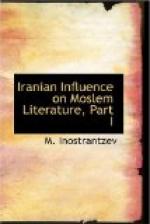In preparing the Appendices, which are there to testify to the value of Arabic literature especially the annals and the branch of it called Adab, I have availed myself of the courtesy of various institutions and individuals. Bombay, perhaps the wealthiest town in the East where prosperous Musalmans form a most important factor of its population, has not one public library containing any tolerable collection of Arabic books edited in Europe. Time after time wealthy Parsis whose interest I enlisted have received from me lists of books to form the nucleus of an Arabic library but apparently they need some further stimulus to appreciate how indispensable Arabic is for research into Iranian antiquities. The Bombay Government have expended enormous sums in collecting Sanskrit manuscripts—a most laudable pursuit—and have published a series of admirable texts edited by some of the eminent Sanskrit scholars, Western and Indian. But the numerous Moslem Anjumans do not appear to have demonstrated to the greatest Moslem Power in the world, or its representative in Bombay, the necessity of a corresponding solicitude for Arabic and Persian treasures which undoubtedly exist, though to a lesser extent, in the Presidency. And what holds true of Bombay holds good in case of the rest of India. Some of the libraries in Upper India in Hyderabad, Rampur, Patna, Calcutta possess along with manuscript material cheap mutilated Egyptian reprints of magnificent texts brought out in Leiden, Paris and Leipzig. Nowhere in India is available to a research scholar a complete set of European publications in Arabic, which a few thousand rupees can purchase. The state of affairs is due to Moslem apathy, politics claiming a disproportionate share of their civic energy, to Government indifference and to some extent Parsi supineness and prejudice which, despite the community’s vaunted advancement, has failed to estimate at its proper worth their history as enshrined in the language of the pre-judged Arab.
Moulvi Muhammad Ghulam Rasul Surti, of Bombay, himself a scholar, lent me from his bookshop expensive works which few private students could afford to buy. No western book-seller could have conceived a purer love of learning or a gaze less rigidly fixed on “business”. Sir John Marshall, Director General of Archaeology in India, continued very kindly to permit me use of books after I had severed official connection with his library at Simla. Dr. Spooner who acted for him obligingly saw that as far as he was concerned no facilities were incontinently withdrawn from me at Benmore. I have particularly to thank the Librarian of the Imperial Library, Calcutta, who not only posted me books in his charge but went out of his way to procure me others. Mrs. Besant and her wealthy adherents have created at Adyar the atmosphere associated with the Ashramas and the seats of learning in ancient India so finely described by Chinese travellers. The Oriental Library there is unsurpassed by any institution




